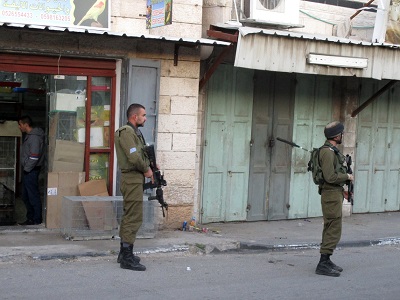
Israeli forces continued their blockade of the central West Bank city of Ramallah and its neighboring villages and towns for the second straight day on Monday after a shooting at an Israeli military checkpoint.
Israeli forces began the blockade just hours after the shooting near the illegal Israeli settlement of Beit El north of Ramallah, in which a Palestinian Authority staff sergeant shot and injured three Israeli soldiers before he was shot dead at the scene.
The Israeli army has yet to announce when forces will pull back to allow freedom of movement through the major West Bank hub. An Israeli army spokesperson told Ma’an the closure would continue until further notice, with forces assessing the situation daily.
The director of the Palestinian liaison office in Ramallah, Nadir Hajji, told Ma’an that the Israeli authorities notified the Palestinian liaison office that the cities of Ramallah and al-Bireh would be sealed, except for local traffic.
An Israeli army spokesperson said that Ramallah residents are allowed to enter the city, but they are not allowed to leave, while non-residents are allowed to leave the city, but not allowed to enter.
Hebrew-language media published several exceptions to rule:
– All humanitarian cases can pass through all checkpoints.
– High-profile Palestinians can pass through the Beit El checkpoint, which is closed, after coordinating with the Israeli military liaison office.
– Holders of Israeli identification cards and holders of work permits can pass through Qalandiya checkpoint in both directions.
– Reporters can pass to and from Ramallah through all checkpoints
Witnesses told Ma’an that Israeli forces had activated all military checkpoints around Ramallah — many of which are normally unmanned — in addition to several flying checkpoints set up throughout the area.
Locals said every car was being stopped and inspected at the checkpoints, with passengers’ identity cards scrutinized before being allowed to enter or exit Ramallah, causing long waits for non-Ramallah residents attempting to leave the city as well as Ramallah residents on their way home.
Villagers in Ein Sinya, north of Ramallah, as well as residents of Jaba, east of Ramallah, and Atara and Birzeit north of Ramallah, told Ma’an that many permanent checkpoints where nearly impossible to get through, as soldiers were taking up to 10 minutes inspecting every car passing through.
Locals also complained that flying checkpoints were unpredictable and had closed off areas that normally allow free passage.
Furthermore, Israeli forces have continued to seal the occupied central West Bank village of Beit Ur al-Tahta, west of Ramallah, as well as several other villages in the area that were closed last week after two Palestinian youths carried out a stabbing attack in a nearby illegal Israeli settlement, killing a woman and injuring another.
While some villages have been sealed to traffic, last week Israeli forces also closed a main road at the Beit Ur junction and Route 443, which prevented residents of at least 20 other villages from being able to access Ramallah.
Israel’s security cabinet in November gave the Israeli army the liberty to seal Palestinian villages in the occupied West Bank without first receiving approval from the government.
A senior Israeli official told Israeli daily Haaretz at the time that military commanders would be authorized to independently implement the total closures while “searching for suspected terrorists.”
The military was already carrying out the decision without such approval prior to the cabinet’s meeting, the report added.
While Sunday’s closure around Ramallah has been the largest blockade of a main city, the Israeli military has frequently sealed villages and cities in areas around an attack or near the hometown of an attacker since an increase of such attacks sparked in October.
Locals have also reported closures following clashes between residents and Israeli forces, as well as arbitrary closure to prevent Palestinians from roads used by Israelis and settlers.
Most notably, increased military presence spread across the Hebron district following the wave of unrest that spiraled in October, with the UN Office for the Coordination of Humanitarian Affairs reporting higher restrictions in the district than any other area across the occupied Palestinian territory.
Israeli military checkpoints have been set up at the entrances to many Hebron-district villages, and residents have reported harassment, arbitrary detentions, an increase in traffic, and curfews.
(MAAN)




